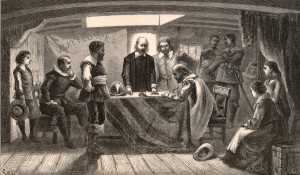| Puritan governor
of Massachusetts Bay Colony who laid the foundations for New England
society. |
 |
|
Puritans
sign "the Mayflower Compact" binding
their community "to the glory of God and the advancement of
the Christian Faith"
|
During Winthrop's
youth, colonial settlement
was already underway: the first permanent English settlement was established
in Jamestown, VA in 1607; English Puritans founded a colony in Plymouth,
Massachusetts in 1620. Born to a wealthy family, John Winthrop became
committed to Puritanism during
student days. Winthrop was a successful lawyer in London by the time Charles
I became King of England in 1625. Under Charles, Puritans suffered discrimination
and persecution. This provoked the "great migration" in which thousands
of Puritans left England, mostly for New England. In 1630 John Winthrop
led the first group of colonists to the Massachusetts Bay Colony. In a
now-famous sermon delivered on board their ship Arbella, Winthrop
exhorted the colonists to keep their "covenant" or solemn obligation to
God and to each other. Their community would be like a "city on a hill,"
with the eyes of all the world upon it. Winthrop served as governor of
Massachusetts Bay Colony for seventeen years. During his first year the
vote was extended to include all free male citizens who were members of
the church--a much wider franchise than existed at the time in England.
Winthrop's critics saw him as too lenient, although under Winthrop's rule
the dissident Puritans Anne Hutchinson and
Roger Williams both were banished from the
Bay colony for disturbing the civil and religious peace.
|